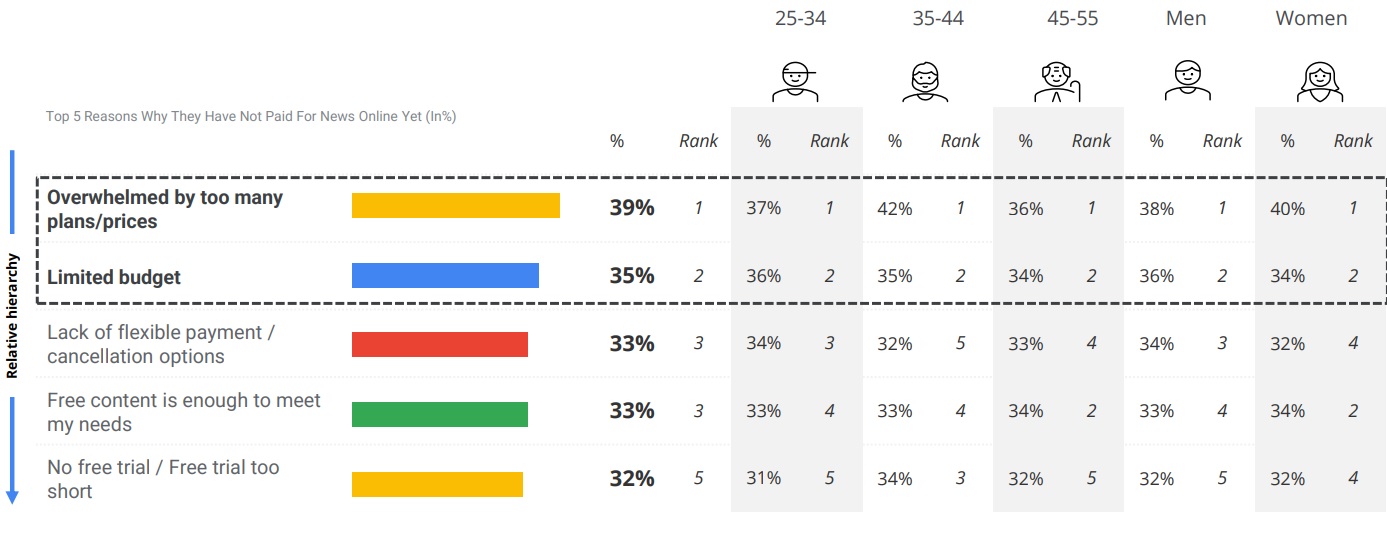- By Talibuddin Khan
- Tue, 06 Aug 2024 08:41 PM (IST)
- Source:JND
The way Indians consume news is witnessing a drastic shift with digital platforms becoming the primary source of information for many. Amid the ever-increasing usage of smartphones and internet access, news consumers in India are increasingly turning to online sources, seeking reliable and in-depth coverage in their preferred languages. This transformation is not just about access but also about the willingness to pay for quality content, a report by Google in collaboration with Kantar reveals.
For Indian news subscribers, news is not merely about staying informed, it has become an integral part of daily life. The Google-Kantar report titled "The Indian News Consumer: Willingness to Pay and Key Drivers", said that Indian subscribers are serious news hunters who prioritise both the breadth and depth of coverage.
Motivation For Paying For News Online
According to the report, two out of three Hindi-speaking people now prioritise news in their preferred language. The report further revealed that "news in the preferred language" is a highly valued content element across various language groups, including Hindi (67 per cent), Bengali (75 per cent), Tamil (63 per cent) and Gujarati (79 per cent). About 67 per cent of current news subscribers in the study cited "reliable content" as a primary factor in their decision to subscribe.
Apart from the preferred language, specialised content, catering to niche interests is another strong driver to convert users into subscribers. Meanwhile, the convenience of uninterrupted, ad-free news consumption enhances the appeal of digital subscriptions. Significant life events such as starting a new job, elections or personal experiences with misinformation can also trigger the decision to subscribe, the Google-Kantar study revealed.
Additionally, the willingness to pay for digital news content, whether through subscriptions or other models, is comparable between local language and English language news consumers in India. "Both Kannada and Tamil speakers are relatively more receptive to subscriptions. They are also open to sharing first party data and micro-transactions in form of either pay per content or mini access pass," the report said.
Obstacles In Converting Free Users Into Subscribers
According to the Google-Kantar study, hurdles to paying for news online roughly fall into four broad categories:-
1. Price & Value
- Limited budget
- Unsure if worth the price
- News pricier than other subscriptions
- Complexity of managing multiple subscriptions
2. Need & Offering Mismatch
- Unaware of paid options
- Local news apps I'm into do not offer subscriptions
- Cannot pick and pay for what I want
- Lack of flexible payment/cancellation options
3. Frictions During Sign Up/Trial
- No free trial/Free trial too short
- Overwhelmed by too many plans/prices
- Complicated signup process
- Inadequate access to premium content samples
4. Content Need & Trust
- Don't trust any news source
- Unsure of the most reliable news apps
- Free content is enough to meet my needs
- Subscription limits exploration
According to the data in the Google-Kantar report, "overwhelmed by too many plans/prices" and "limited budget" are the primary reasons across all age cohorts and genders for not paying for news online. Other significant factors include the lack of flexible payment/cancellation options, satisfaction with free content, and the inadequacy or absence of free trials.

What News Platforms Can Do To Overcome These Challenges
The study, "The Indian News Consumer: Willingness to Pay and Key Drivers", noted that these challenges underscore the need for publishers to clearly articulate the value proposition behind each while addressing pricing and flexibility concerns. Users, while recognising the value of quality journalism, are overwhelmingly driven by convenience, and deterred by cost and a lack of clarity regarding the value proposition of paid subscriptions, the study noted.
Durga Raghunath, Head of India News Partnerships, Google India, said that understanding the nuances of reader revenue models is crucial for the sustainability and growth of digital news. "As part of our ongoing efforts to support the news ecosystem, this research provides valuable insights into reader preferences and behaviours, empowering publishers to make informed decisions about their monetisation strategies and build stronger connections with their audiences," she said, as quoted by IANS.

